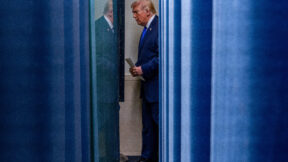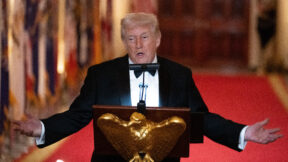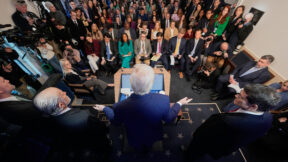Meet The Prensa: Roberto Lovato’s Post-Dobbs Victory Lap
What is your reaction to the statement of Jonathan Klein saying that Lou Dobb’s resignation had nothing to do with the Latino grassroots campaign against him?
If I were Jon Klein, I would say the same thing. Does Jon Klein or any media outlet want to admit to the power of the people, to exert their pressure? Do we expect anything else from the president, one of the most powerful media corporations in the world? I mean, we never expected recognition, acknowledgment or anything from Jon Klein about our campaign until it became inevitable for him. And I think that inevitable moment was last Friday [November 6], when he met with Alex Nogales. Mr. Nogales flew [to New York] from Los Angeles specifically and only to meet with Jon Klein at Jon Klein’s indication.
So Jon Klein wasn’t acting that way last Friday when, you know… He sounded —from what I heard about that meeting— he sounded as, “If we respond to your demands, that will send the wrong message to everybody.” “Everybody” is the other media outlets in the country.
I mean—let me give you an example. I’ve been to some panels on media reform or —as some people call it— “media justice,” where someone asked me once, “Hey, Roberto, why don’t people cover the takeover of radio stations in Oaxaca [Mexico]. Why don’t the US media cover that?” So my answer was very simple: Do you think that radio and television in the United States want people in the US to see pictures, images, sounds, of people taking over radio and television stations? I think not!
So, you know, Mr. Klein is doing his job, making sure the barbarians don’t get beyond the gate.
So what was the conclusion of that meeting between Alex Nogales and Jon Klein?
My understanding is that Jon Klein told Alex Nogales that to some level shared our desire to have Lou Dobbs leave, but that he couldn’t respond to us, because it would set a bad precedent. So he would never publicly admit that. That’s fine: our demand was to have Lou Dobbs gone and he is out. For our campaign, Basta Dobbs, we organized in 25 cities, we had dozens of organizations assembled, had more than 100,000 signatures. And we were eventually going to go knock on the doors of CNN advertisers.
If Jon Klein says, “I didn’t even notice that these people had amassed 100,000 signatures and were probably going to go after our advertisers,” he is either arrogant or lying.
[Note: Mediaite reached out to CNN for comment and they responded with this statement: “It’s been said by both Jon and Lou repeatedly that that Lou’s departure was both mutual and amicable. Outside groups were not responsible for the decision.”]
A few weeks ago you told me you were going to take the campaign to Latin America, because of CNN en Español.
Yes. Yesterday [November 12] we had organized a hemispheric tele-press conference with outlets from Central, South and North America, Spanish-speaking outlets throughout the hemisphere: Ecuador, Colombia, El Salvador, México, the Dominican Republic and the United States. We had outlets from the whole Spanish-speaking world that CNN en Español speaks to. We were already articulating and developing our plans to expand our educational work against CNN in the Americas. And the Spanish-speaking media in Latin America was extremely interested for journalistic reasons and for what I would call political or business reasons.
We were also starting to work on translating Lou Dobbs into Spanish, because they didn’t do that, right? CNN translated Latino in America and exported it to Latin America. So we were going to start the work of translating Lou Dobbs and exporting him to Latin America, and let the people decide what kind of a company CNN is.
“The Latino community, more than any other community, really understands the historic meaning of the demise and fall of Lou Dobbs, the most dangerous man for Latinos in the United States.”
But I should be clear about this: We are saying [that Dobb’s resignation is] “our victory,” but we—the Basta Dobbs campaign and others— are not solely responsible for Lou Dobbs leaving, and that’s not what we are trying to say. Clearly, Mr. Klein didn’t want a non-journalist like Lou Dobbs to continue bringing down the value of the CNN brand. And that’s an internal decision.
By the way, just let me say this for the record: Some of our strategy was designed based on information we received about Jon Klein and about the workings of CNN provided by guess who?
Who?
CNN employees themselves. Because, for what we know, and for all the love for CNN employees that he expressed in his farewell speech, Lou Dobbs had an enormous amount of repudiation inside of CNN itself. So he was a demoralizing factor to the workers of CNN. We knew this from the workers themselves, including producers and people that are not just janitors—people that are in management. The people inside of CNN actually gave us the information that helped us design our strategy.
The example is the split on our video: we knew that CNN was divided by Lou Dobbs, so in our video we use Soledad O’Brien to symbolize that split inside CNN. And let me be honest: this is where our campaign was really smart. There were calls to boycott “Latino in America.” We could have boycotted [that show] but we made a strategic decision not to. Inside information from CNN workers told us about a CNN split about Lou Dobbs from the lowest levels to the highest levels of management, so we made a strategic decision to help the forces of good inside CNN itself. That led to the split screen in our video: “You can’t have it both ways, CNN.”
Don’t you consider ironic that, to a certain degree, Latinos should be thankful of Lou Dobbs? Because he triggered a grassroots movement that could turn into something else. This could even be the biggest movement of Latinos in the history of the country.
Oh yeah. Clearly. Latinos owe Lou Dobbs nothing less than the push that was needed to bring them into the digital media era of civil and human rights. A lot of other groups have focused on media issues. Latinos haven’t really —some have, like the Hispanic Media Coalition, who started looking at the issues in the media and at the media. But there was never a mass movement from Latinos that was sustained until now.
Where is this coalition going now? What’s the next goal?
Right now our goal is to, first, rest; secondly, celebrate. There have been celebrations in New Mexico… I’m in North Carolina right now, on my way to a celebration complete with champagne bottles and music and everything. It’s just like that. Next week in San Francisco we are having our big celebration —that’s where our offices are. Tomorrow night in New York there’s a celebration. And we haven’t met with our own coalition. We have been just responding to the moment. There are going to be several celebrations across the United States, because the Latino community, more than any other community, really understands the historic meaning of the demise and fall of Lou Dobbs, the most dangerous man for Latinos in the United States.
We are celebrating our participation in —and I really want to say this— that we reached a milestone in our community, because we already won for ourselves the moment we fought back in a serious and sustained way. We had already won, when we said “Ya Basta” to the people that were profiting economically from the hatred promoted, sustained and expanded by Lou Dobbs.
And I describe that as an act of self-love, because people ask me, “Aren’t you fighting hate with hate?” and I say no, we are fighting hate with love, with love for ourselves. We love ourselves enough to say “¡Ya! I don’t accept this,” “We don’t accept this.” That is why we had more than a hundred thousand people join our campaign. So the key to getting all the signatures was not just technology and media and organizing. It was the spirit and the desire of the people to stop the media from devastating it. In this case, one of the biggest media outlets in the world, CNN, that had a business model based on promoting the hatred of immigrants and Latinos.
So it would be a beautiful world in which Jon Klein would step up to the microphone and step up to the public and say, “We recognize the passion and power of the Latino community for social, cultural change. We heard them say ‘Basta with the hatred, stop profiting from that,’ and we made a business decision to stop profiting form hate.” Wouldn’t it be an ideal world where Jon Klein and the Jon Kleins of the world were able to say that? We don’t live in that world yet, but we do live in a world where there’s no Lou Dobbs, and not just because of Jon Klein and Lou Dobbs decided, but because Latinos decided that they had had enough.
Pages: 1 2
This is an opinion piece. The views expressed in this article are those of just the author.
New: The Mediaite One-Sheet "Newsletter of Newsletters"
Your daily summary and analysis of what the many, many media newsletters are saying and reporting. Subscribe now!






Comments
↓ Scroll down for comments ↓